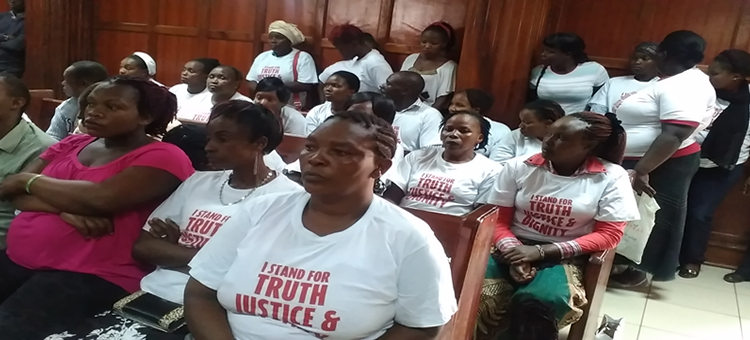By Joyce J Wangui
Dozens of women raped during the post-election violence still need counseling nine years on.
To date, few of the survivors have received the comprehensive psycho social support required to put back their lives together. “Our lives are still at a standstill,” Clarisse Akinyi, a survivor of rape in Mathare slums told JFJustice. Akinyi was among 50 survivors in court last week during the hearing of a case filed by eight sexual violence survivors.
During the hearing, two expert witnesses told the court about their interactions with survivors of rape.
The first witness, Teresa Njure, works at KNH’s mental health department of the Gender Recovery Centre that offers psychosocial support, including trauma counselling to survivors of sexual and gender based violence. Njure said she assisted several women who had been referred to her. “Those who came to us were distressed. Some were extremely anxious as they reported how they were sexually abused during the violence.” She recalled how her centre received numerous referrals from other hospitals and also walk-in patients.
“For many sexual violence survivors, emotional wounds take time to heal,” she told an open court. She says there is no specific timeline for such wounds to heal and this depends on the psychological therapy that a survivor is exposed to.
The expert witnesses told the judge how victims complained of having been raped by “men in uniform”-in particular naming police men the General Service Unit (GSU) officers. “When they came to hospital, they told us that the police were unwilling to act; some turned them away, others refused to document their claims,” recalled Njure.
The second expert witness, Elizabeth Mukhisa who retired at the Kenyatta National Hospital in 2014 as a nurse, told the court that survivors of rape from the post poll period require consistent therapy to help them heal.
Without this crucial therapy, they end up slipping back to depression. She admits that the government hospital was ill equipped at the time, to handle numerous cases of post rape trauma.
The nurse also recalled that survivors said they were afraid of reporting their ordeal to the police, fearing reprisals. The survivors are supported by other petitioners from non-governmental organisations including the Coalition on Violence against Women, the Independent Medico-Legal Unit, the Kenyan Chapter of the International Commission of Jurists, and Physicians for Human Rights.
The case follows a petition filed by eight survivors of PEV sexual violence in the constitutional court in February 2013. It seeks to compel the government to address sexual violence that occurred during chaos and to compensate victims. Specifically, the survivors want the truth about what happened to them known; and they want the State to acknowledge that they suffered. They also want the State to begin credible investigations and prosecutions and provide reparations including medical and psychological treatment.
“The case seeks to have the court establish that important government offices and their holders failed to prevent the violence, protect the survivors from sexual violence, investigate and prosecute perpetrators, and provide effective remedies to the victims,” the petitioners say, adding that these failures amount to violations of fundamental rights and freedoms protected in the Constitution.
The hearings started in March 2014. Christine Alai of Physicians for Human Rights, one of the petitioners, told JFJustice the petitioners filed the case as a response to the lack of serious action on the part of the government to investigate sexual violations that occurred during the violence, refusal to acknowledge victims and failure to provide medical and psychological treatment that many survivors urgently required.







